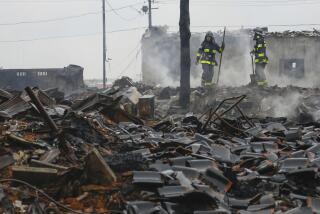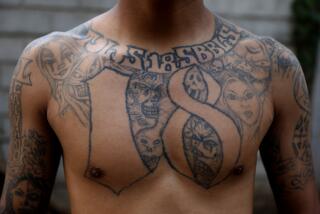Gangs Bridge Relief Gap After Quake
- Share via
KOBE, Japan — In a wealthy neighborhood in the hills above quake-battered Kobe, hundreds of well-dressed residents join a line that snakes around the block of a large walled compound. They leave loaded down with buckets of water, six-packs of toilet paper, bags of disposable diapers and packets of noodles, cake and powdered milk.
“Distribution point for baby goods,” says a sign on the wall.
Is this a government distribution point for the needy?
Hardly. It’s the fortress-home of a leading boss of the Taokagumi, a branch of Japan’s largest gang, the Yamaguchi-gumi.
The boss is part of a large group of gangsters and right-wing radicals who have moved quickly into a relief effort while the government has been slow to respond. Their action has underscored the problems of organizing disaster relief in a society of rigid bureaucracies and private relief groups that are typically small and understaffed.
“They (the gangs) are better organized,” said one young man in line Saturday, who like most others refused to give his name. “The government is too slow; you can’t depend on them.”
Residents say the gang has been thoughtful about their needs. “We’re really happy about this, especially the diapers,” said a father carrying a 2-year-old boy.
“They are right on target,” an American resident of the neighborhood said, noting that the gang was even distributing sanitary napkins, unavailable in a city shut down by toppled telephone poles, fires and collapsed buildings.
At an elementary school serving as temporary housing for hundreds of refugees, fried noodles were being served from a large black truck prominently displaying the Japanese flag.
“We brought enough to serve 14,000 meals, but we only have about 1,000 left,” said Masataka Wataya, a member of the right-wing group Seiji Kessha. He said he drove from distant Yokohama with six other members of his group to help feed the hungry.
The group is one of seven right-wing organizations with an estimated 100 members involved in the relief effort. The groups are typically associated with patriotic, anti-foreign, pro-military views.
“We can move faster than the government because we don’t have to deal with all these administrative things,” Wataya said.
“This is really great, it shows real concern,” said Toshikazu Nakamura, a construction worker who lost his home in Tuesday’s earthquake and says he hasn’t had a hot meal since. “The government has been slow to react.”
Outside the Taokagumi boss’s fortress, residents said the gangs’ efforts were particularly appreciated the day after the quake, when food and water were scarce. The gang headquarters contains a well that was not affected by the disaster.
Some locals are wary of the gangsters’ motives. The Taokagumi boss, for example, has a personal reason to win neighborhood approval. Just a block away from his house is a large sign that says: “Chase the gangsters out.” Locals say there have been several shooting incidents over the years, and the neighborhood has been trying to organize an effort to push the gangsters out.
“It drops the value of your land,” a housewife said. But she isn’t shy about accepting the gifts. “This is food and water we need to live,” she said.
Has the publicity helped the gangsters and right-wing groups? Some neighbors said it will be hard to organize against the gangs because of their charity. But others say their feelings won’t change.
“I’m thankful, but somebody else should be doing it,” said a female college student, blaming the government for its ineffectiveness in providing relief.
Added the young father: “It’s nice they are doing this, but it doesn’t change the way I think about them.”
More to Read
Sign up for Essential California
The most important California stories and recommendations in your inbox every morning.
You may occasionally receive promotional content from the Los Angeles Times.










